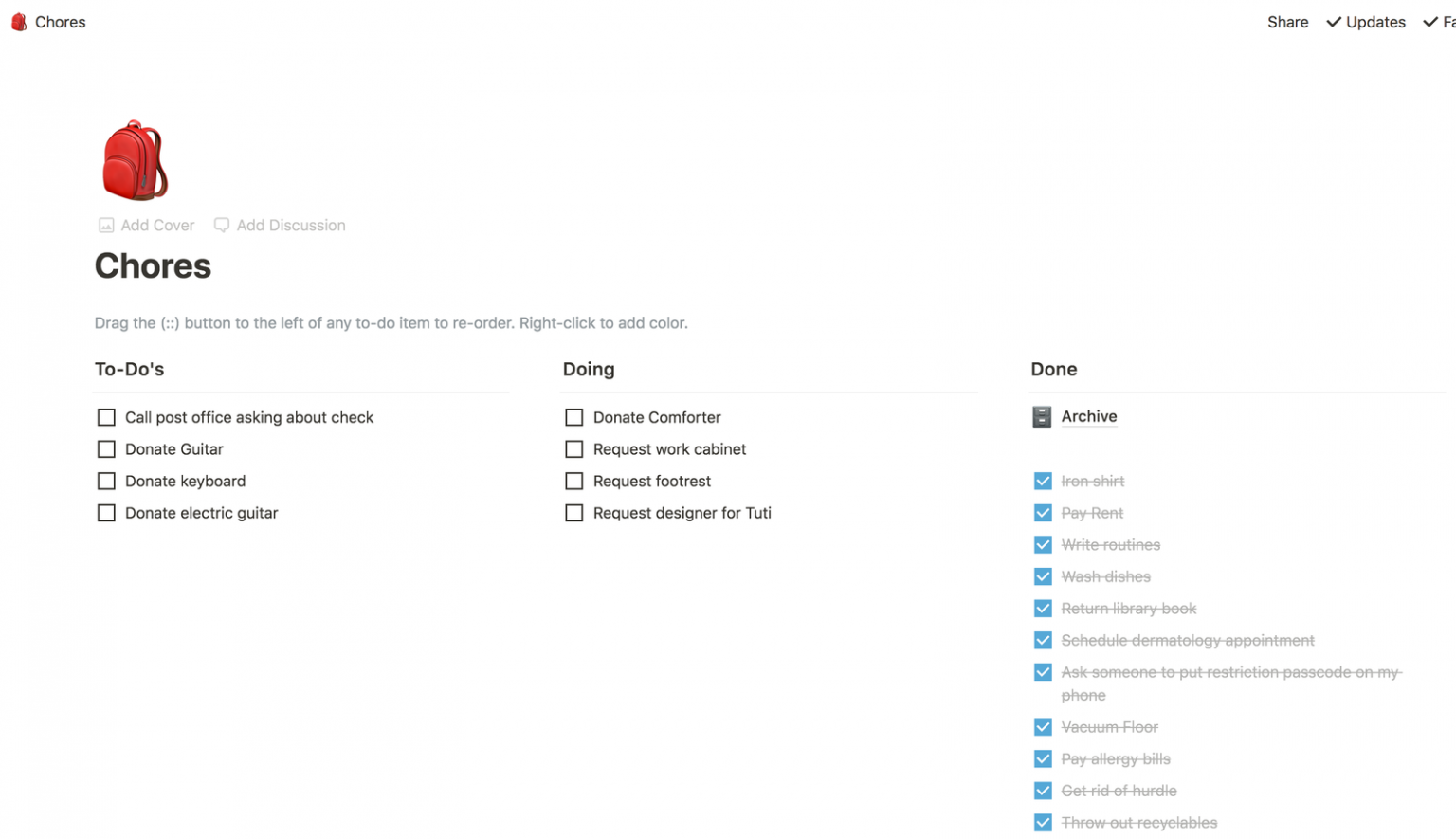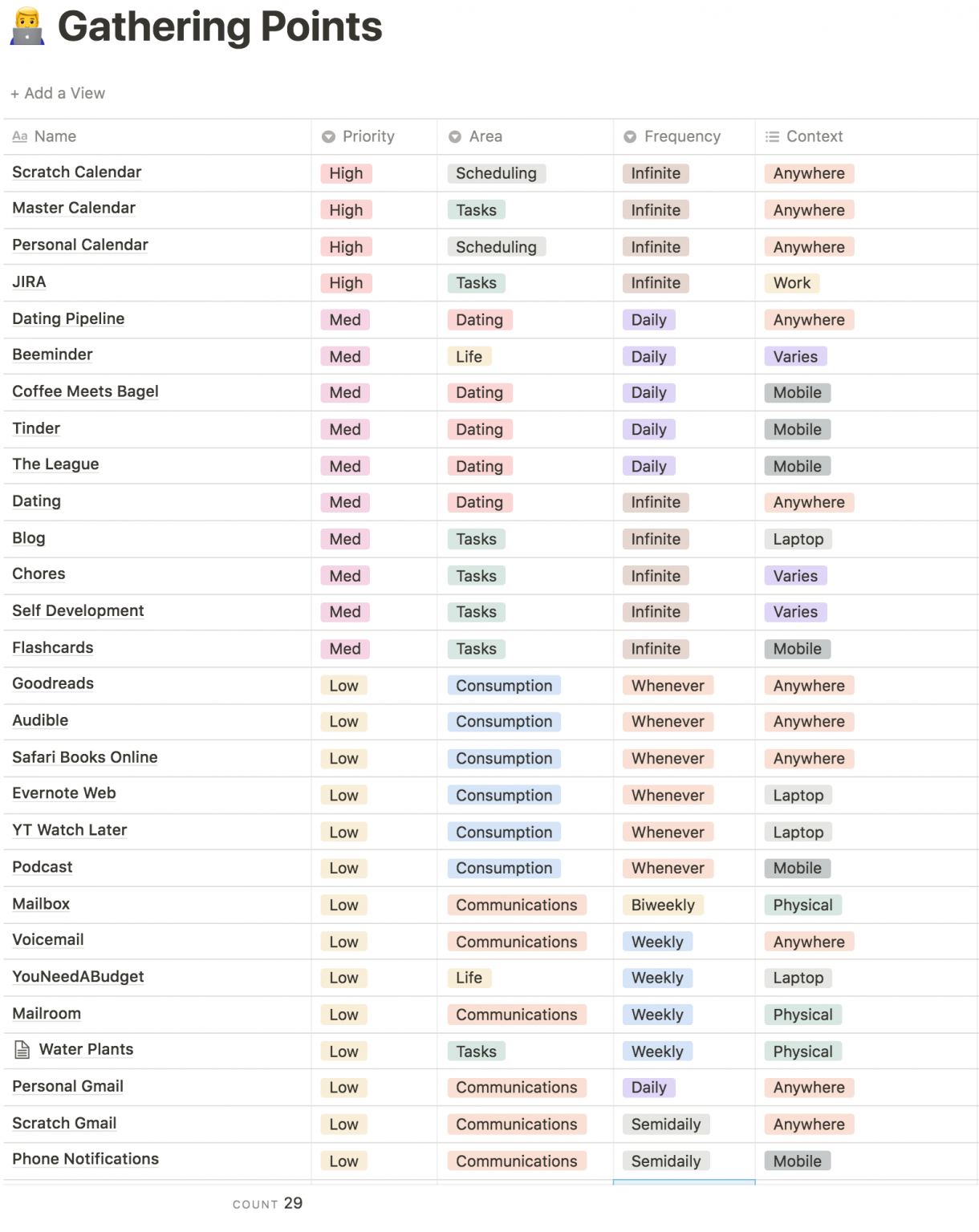Priority Management¶
Quote
“You can do anything, but you can't do everything” — David Allen
People can do a lot of things, but they can't do everything. We are bottlenecked by the resources we have, whether that is time, money, energy, or something else. Because we can't do everything, we have to choose what matters to us and what doesn't. Humans are bad at figuring this out, and you can spin your wheel as fast as you want and still go nowhere. This section is to help develop a “productivity map”, which involves developing a rigorous understanding of what your priorities and goals are and aligning your behaviors towards your priorities.
Understanding Your Needs¶
Humans have a number of needs that play different relative roles in shaping your priorities depending on your own personal circumstances. I've roughly grouped them into 3 categories roughly modeled after Maslow's Hierarchy of Needs, each with their own unique characteristics.
Physiological needs: Food, shelter, health, safety and security of those needs being met. Physiological needs are met via execution of tried-and-true advice.
Social needs: Connection, intimacy, friendship, community. Social needs are met via tactical execution of general principles.
Psychological needs: Self-esteem, sense of purpose, self-dignity, ethical living. Psychological needs are met through trial-and-error, exploration, and self-discovery and is more-or-less a never-ending pursuit.
People can be multi-motivated. There is rarely any moment in which a person operates solely on one need.
-
People can be multi-motivated. There is rarely any moment in which a person operates solely on one need.
-
Unmet social and psychological needs can make a person unhappy. Fortunately (or unfortunately depending on how you look at it) humans are pretty resilient and flexible and can have those needs partially met or substituted with something else. These tend to be unhealthy and cause problems down the road.
Physiological needs¶
Physiological needs are what certain psychologists call "deficiency needs", which means that these needs become a priority if they are not sufficiently met.
The research on what you need to fulfill your physiological needs is overwhelmingly unambiguous. You need a stable income to afford food and shelter and maintain healthy habits to eat healthy foods, drink enough water, nad get enough sleep every day.
Meeting physiological needs requires consistent maintenance, as you'll have to eat every day and be able to afford your lifestyle so expect maintaining these needs to be a lifetime endeavor.
Social needs¶
Social needs are also a deficiency need that tends to be a priority and causes problem when not met.
However, unlike physiological needs, social needs can be met in unhealthy way. This could be through addictive behaviors (like pornography or drugs) or unhealthy relationships (parasocial or toxic relationships). These escape valves allow people to shoulder the burden of not having their needs met in complete or healthy ways.
Social needs also have more individual variability than physiological variablity, but still less than psychological needs. People need to feel close and vulnerable to people, but the degree and way of expression can vary from person to person, and from one phase of life to another, so fulfilling this need is also a lifelong endeavor that takes more consistent reflection and self-study
Psychological needs¶
Psychological needs have the highest variability amongst people, and people tend to get this one wrong very often.
It takes time to figure out what makes you happy, and often people's experiences and environment conditions them towards chasing things that aren't satisfying. It turns out due to various factors, people are bad at knowing what makes them happy. To get a taste of this, watch this TED talk by Dan Gilbert that talks about some interesting scientific studies surrounding happiness.
Mitigating this bias requires understanding and embodying two core wisdoms: 1. Understanding the foundational factors of happiness 1. Understanding the psychological aspects of happiness
Foundational¶
Human needs¶
Look at this pyramid that's called Maslow's hierarchy of needs.
The foundational 2 out of the 3 bottom rungs of the pyramid (Physiological needs and belonging and love needs) require constant time and energy to maintain (anywhere from 13 - 21 hrs of your day). Before thinking about what the purpose of your life is, or pondering on what you find meaningful, you should be addressing problematic issues in these areas of life first. The research is overwhelmingly unambiguous on how to address these needs. It's not strategic decision making, it's execution. Eat healthy foods and drink enough water, get 8 hours of sleep a day, and develop close friends and relationships with those people around you. Build and grow a lifestyle that supports these needs.
No, you don't have to solve needs, but these needs should be examined first whenever you feel unsatisfied or unhappy. When people are unhappy, they rationalize that emotion looking at the upper rungs of the pyramid when they should be looking near the bottom. Instead of asking “why am I sad?”, you should start with asking, “Am I hungry, tired, or lonely?”. More often than not, the base aspects are more often neglected.
Once you've developed the habits that take care of the basic needs, we'll start talking about the more abstract needs. Unlike the other needs, these needs are vague, ambiguous, and highly variable across individuals.
Many of us fall into the trap of not critically thinking about how we can find happiness and meaning and end up expending our time and energy on things that don't do that. We lose track of ourselves and neglect our basic needs and end up feeling more unhappy. You want to invest some time carefully examining and reflecting on what makes you happy.
Consider one of my favorite quotes from the book The Inner Game of Tennis, in which Timothy Gallwey talks about the tragedy of children who were raised to become competitive tennis players:
“Children who have been taught to measure themselves [in comparison to others] often become adults driven by a compulsion to succeed which overshadows all else. The tragedy of this belief is not that they will fail to find the success they seek, but that they will not discover the love or even the self-respect they were led to believe will come with it. Furthermore, in their single-minded pursuit of measurable success, the development of many other human potentialities is sadly neglected. Some never find the time or inclination to appreciate the beauties of nature, to express their deepest feelings and thoughts to a loved one, or to wonder about the ultimate purpose of their existence”
— Timothy Gallwey
It's okay to not have a crystal clear picture of where you want your future to be. I've met a large enough number of people who are happy to go with the flow. It's also okay to be satisfied with your lifestyle. However, I've also met many of those people described by Gallwey and Gilbert such that I would still consider it important to at least reflect on what you really want.
To begin, I recommend examining and exploring your career by reading 8000hours' career guide, which dives into the science and research of a person's career and prescribes some recommendations for job satisfaction and career exploration. I also recommend taking inventory of the various verticals of your life via Alex Vermeer's guide (it's part 2 of the PDF), which gives you an opportunity to reflect on the current state of life and where you might need more work on.
If you still lack a strong conception of what you want to do in your life, here are some goals that are worth considering that are generally good and serve as good meta-goals (goals that help you accomplish future goals):
- Being healthy and fit: Being healthy means living longer and healthier lives. It contributes to physical, mental, and emotional health. It's actually hard to achieve goals in general without having a good grasp of this.
- Achieving financial independence: having financial independence means money generally doesn't stand in the way of doing what you want. You can spend more time doing the things you actually want to do. More money also means more leverage and resources to achieve the goals you want. More wealth is associated with a deluge of benefits, of which include better health, happier lives, and having more impact in the world.
- Educating yourself: Obtaining higher education or simply learning more from your current life yields higher aptitude for accomplishing future goals. Higher education is strongly correlated with higher income, more meaningful relationships, lower rates of divorce, and higher life satisfaction.
- Developing a healthy social life: People who have a strong network of friends and support group are more robust to stress, anxiety, depression, and all sorts of mental illnesses. People who have stronger networks subjectively report happier and more meaningful lives.
- Maximizing impact: Having more career capital equates to having more impact. By the time you figure out what you want to do, you'll already be in a better position to achieving it.
- Minimizing bullshit & toil: Solving the complement issue of what you want to do by thinking about how to minimize what you don't want to do. Bullshit is, by definition, stuff not worth wasting your life on. Toil are manual, repetitive work that is similar to bullshit, but often are necessary to your daily living.
- Figuring out your goals: The journey to figuring out your goals can be very exciting and rewarding. Most lifelong goals are backed by personal experience and periods of reflection, so pursuing this goal means exploring and trying out new lifestyles and seeing what works for you.
Goals are not meant to be final or absolute. Having a goal doesn't have to mean devoting your all your time and energy to it. Having a map doesn't mean you have to look at it all the time, it's a tool to help you orientate yourself whenever you've strayed off path or if you're lost (and you will be often).
Converting Goals into Behavior¶
The second part of priority management is understanding how you “move” toward your goal. Some goals, like training to run a half marathon, require very little research and planning while others can be extremely confusing, like teaching yourself how to code or finding a romantic partner.
For complex goals, it's super daunting to just “work” on teaching yourself how to code. Human psychology suggests that this is a psychological barrier preventing people from actually working on those goals. The current literature suggests breaking goals down into projects makes the execution process easier and clearer. For example, you might break down your “learn to code” goal into “finish the Codecademy javascript course” and “build a game of tic-tac-toe in React.js”. Research helps. Googling, reading, and interviewing relevant people helps break down the goal into actionable steps.
To learn a bit more about goal design and project planning, consider reading some of Scott Young's materials: The Key to Motivation: Forget Goals, Focus on Projects How to Start Your Own Ultralearning Project (Part 1, Part 2)
You'll want to document and keep track of these tasks. You will most likely need a project or task management software. I find kanbans an intuitive project management interface, so I would opt for something like Trello.
You'll want also want a stereotypical chores/errands to-do list. Kanbans are fine but I personally prefer the more compact view of lists. The golden standard in the industry is Todoist, but Todoist lacks the kanban view while Trello lacks the list view. In order to minimize the number of productivity software I use, I personally use Notion, which supports both views and adds a ton of flexibility for other stuff.


I've created public Trello boards for some of the meta-goals listed above that you can copy (click “Show Menu → More → Copy Board”) to jumpstart your own journeys. Make sure to read the descriptions that I wrote in some of the tasks to give some context and motivation towards each task. These boards are incomplete! They mostly cover the research phase of your project and some low hanging fruits tasks. Make sure to build on top of the templates.
Financial Independence Making and Keeping Friends Figuring out Your Career
When you feel like you've broken down your goal into actionable steps that will occupy you for the next month or so, here are some questions that will help you understand whether or not you've successfully planned a project:
- At any given point, do I know exactly what I need to do to move towards completion in this project?
- Would you bet $500 to your friend that you'll successfully complete this project? If not, why not and how can you mitigate the risk on the completion of the project?
Organizing Desired Behavior¶
Once you've broken down your goals into tasks, you'll want to put these tasks and goals in the foreground of your mind. Too often people go through these exercises and end up leaving those plans in some dark corner somewhere collecting dust. A big reason why that occurs is because we're introducing more work into our lives, and our brains aren't good at keep track of what work we're supposed to do.
A space in which unprocessed items gather is called a “gathering point.” It is a concept introduced by Dave Crenshaw in his course Time Management Fundamentals and he says most people have 30 - 50 gathering points in their lives. If you have to check your work email every day, then your work email is a gathering point. If you have unpaid bills at your desk, that's a gathering point too. If you need to check in with a supervisor to figure out what work needs to be done, gathering point. Your brain is probably your most common gathering point, and tons of stuff gets piled up there. How do you make sure you forgot to check your Gmail inbox, or your voicemail in case someone left something there? When's the last time you needed to respond to those LinkedIn messages, or return the calls from your phone numbers? As you can see, it gets really hectic.
What I found helpful to keep track of my gathering points is to inventory my gathering points, and store that information at an existing gathering point. For me, it would be my personal Notion notebook:

I recommend by jotting this information in an existing gathering point that you already check. This ensures that you actually review this list often. Writing this down will feel like a huge sigh of relief because that's 30 - 50 fewer things you need to keep track of. This will be your meta-gathering point.
The benefit of organizing your goals into projects is that you don't have to keep track of as much context or state with all the things you want to do, the downside is that now you more gathering points to keep track of! What should we do with all this mess?
Unless you are singularly focus on one project for a given period of time, you're going to need to balance different priorities through your day/week/month. After all, there's only one you, and you can only work on one thing in any given time, so you'll need a way to serialize your time. In the “Time Management” section I'll outline a way you can do that, but many people have found the method a bit too hardcore.
Conclusion¶
By the end of this section you should have a clear framework for understanding what you want, what behaviors move you toward each goal, and which behaviors are prioritized. This is not a one-and-done exercise and requires occasional revisions. I find myself reviewing the progress of my goals every 3 months and every year.
-
You don't have to look at this pyramid as the complete working model of human needs. Maslow's hierarchy of needs has faced academic criticism. We don't care about the strict ranking, relative importance, or even the completeness of the pyramid. This model is just simple way for me to lay out common human needs people identify. ↩
